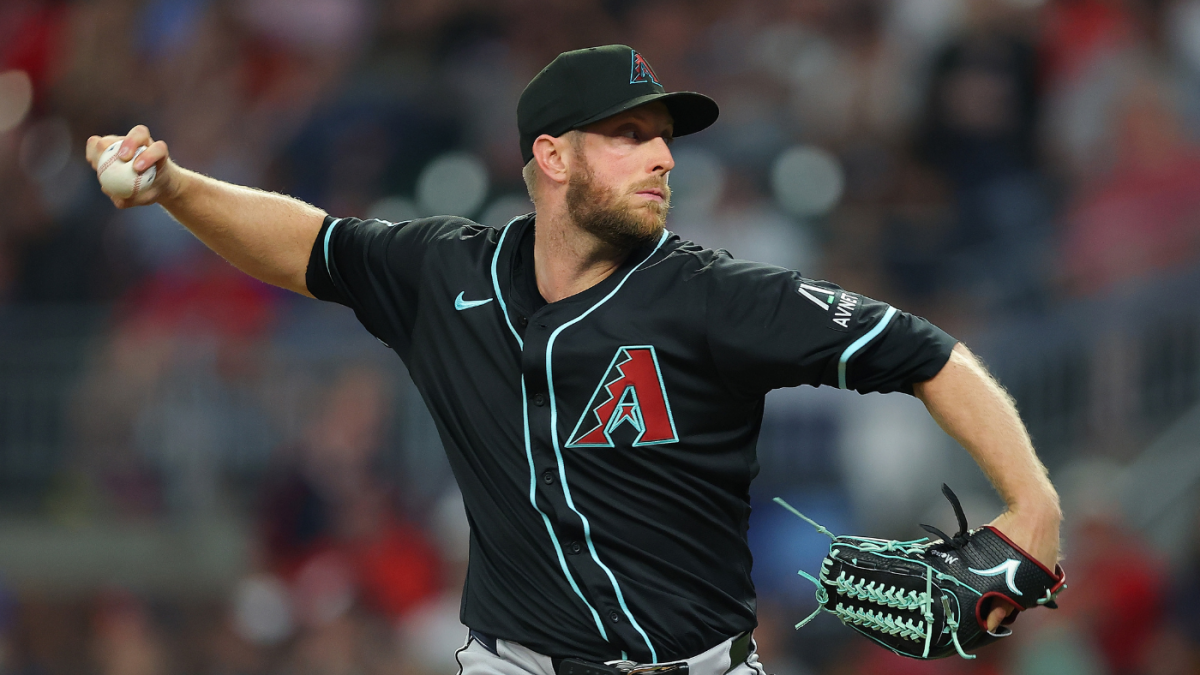The Rangers’ Strategic Gambit: A Deep Dive into the Merrill Kelly Trade
A Rotation Poised for Greatness
The Texas Rangers’ pitching staff has been a cornerstone of their success this season, boasting an impressive 3.16 ERA that ranks among the best in baseball. This rotation is a carefully crafted blend of seasoned veterans and rising stars, each contributing to the team’s dominant performance on the mound. Nathan Eovaldi, when healthy, has been a linchpin, providing both quality starts and leadership. The Rangers’ rotation was already a formidable force, making the acquisition of another starting pitcher a strategic move rather than a necessity. However, in the high-stakes world of Major League Baseball, contenders often seek that extra edge, that final piece to transform a good team into a championship-caliber squad.
Merrill Kelly: The Veteran Anchor
Merrill Kelly, the veteran right-hander acquired from the Arizona Diamondbacks, is not your typical power pitcher. At 36 years old, Kelly brings a different kind of value to the Rangers’ rotation. His 3.22 ERA in 22 starts this season is a testament to his consistency and reliability. Kelly’s pitching style is built on command, movement, and guile, allowing him to navigate opposing lineups without overpowering hitters. His ability to eat innings and keep his team in the game is invaluable, especially in the grueling stretch run and the high-pressure environment of the playoffs.
Kelly’s durability is one of his most significant assets. He has consistently taken the mound every fifth day, providing stability and depth to the Rangers’ rotation. This reliability is crucial in the postseason, where every start can be a difference-maker. Additionally, Kelly’s experience in high-stakes games, including a start against the Rangers in the 2023 World Series, gives him a unique perspective and composure that can be invaluable in clutch situations.
The Cost of Contention: Prospects on the Move
Every high-profile trade comes with a cost, and the Rangers’ acquisition of Merrill Kelly is no exception. In exchange for Kelly, the Rangers sent three pitching prospects to the Arizona Diamondbacks: Kohl Drake, David Hagaman, and Mitch Bratt. These prospects represent the future potential of the organization, and trading them away underscores the Rangers’ win-now mentality.
- Kohl Drake: Details about Drake are limited, suggesting he may be further away from the majors than his counterparts. His potential impact on the Rangers’ future is uncertain, but he represents a long-term investment that the Rangers have chosen to forgo in favor of immediate success.
- David Hagaman: Hagaman is likely projected as a potential bullpen arm. While bullpen depth is crucial, the Rangers have prioritized starting pitching, indicating their confidence in their current bullpen setup.
- Mitch Bratt: Bratt is a promising left-handed pitcher with a solid fastball and developing secondary pitches. As the highest-ceiling prospect among the three, his loss is a significant one. Left-handed pitching is always a valuable commodity, and Bratt’s potential could have been a key asset for the Rangers in the future.
The decision to trade these prospects highlights the Rangers’ commitment to their current window of contention. They are betting that Kelly’s immediate contributions will outweigh the potential future value of these prospects. This is a calculated risk that all contending teams must consider when making deadline deals.
Weighing the Trade: A Calculated Gamble
Assessing the trade’s impact requires a balanced analysis of several factors: the Rangers’ current position, their window of contention, Kelly’s projected performance, and the potential of the traded prospects.
Given the Rangers’ strong position in the standings and their clear desire to compete for a championship, acquiring a reliable starting pitcher like Kelly makes strategic sense. His consistency and experience fill a need for stability and depth in the rotation. However, the cost of three pitching prospects, particularly Bratt, is substantial.
The trade’s success will ultimately be determined by Kelly’s performance down the stretch and in the playoffs. If he can provide quality starts and help the Rangers make a deep postseason run, the trade will be considered a success. Conversely, if he falters or gets injured, the Rangers may regret giving up those prospects, especially if they develop into valuable major league contributors.
A Statement of Intent
The acquisition of Merrill Kelly is more than just a roster move; it’s a statement of intent from the Texas Rangers. It signals to the rest of the league that the Rangers are serious about contending for a championship and are willing to make bold moves to achieve their goals. This trade demonstrates a commitment to winning that can galvanize the team and inspire confidence among the players and the fanbase.
The Rangers’ front office has clearly identified pitching as a key to success, and they are aggressively pursuing upgrades to bolster their staff. This proactive approach sends a message that they are not content with simply making the playoffs; they want to dominate and win it all. This aggressive approach can also impact the team’s morale, showing the players that management is invested in their success and willing to provide them with the resources they need to compete at the highest level.
Conclusion: A Bold Bet on the Present
The Texas Rangers’ trade for Merrill Kelly is a classic high-stakes move designed to improve their chances of winning a championship. While giving up three pitching prospects is a significant price to pay, Kelly’s experience, consistency, and durability could be invaluable assets down the stretch and in the playoffs. This trade underscores the Rangers’ win-now mentality and their commitment to competing at the highest level.
Whether this gamble ultimately pays off remains to be seen, but one thing is certain: the Rangers are all-in on their pursuit of a World Series title. The road to the World Series is paved with tough decisions, and the Rangers have just made one of the boldest. Their bet on the present could redefine their future.











